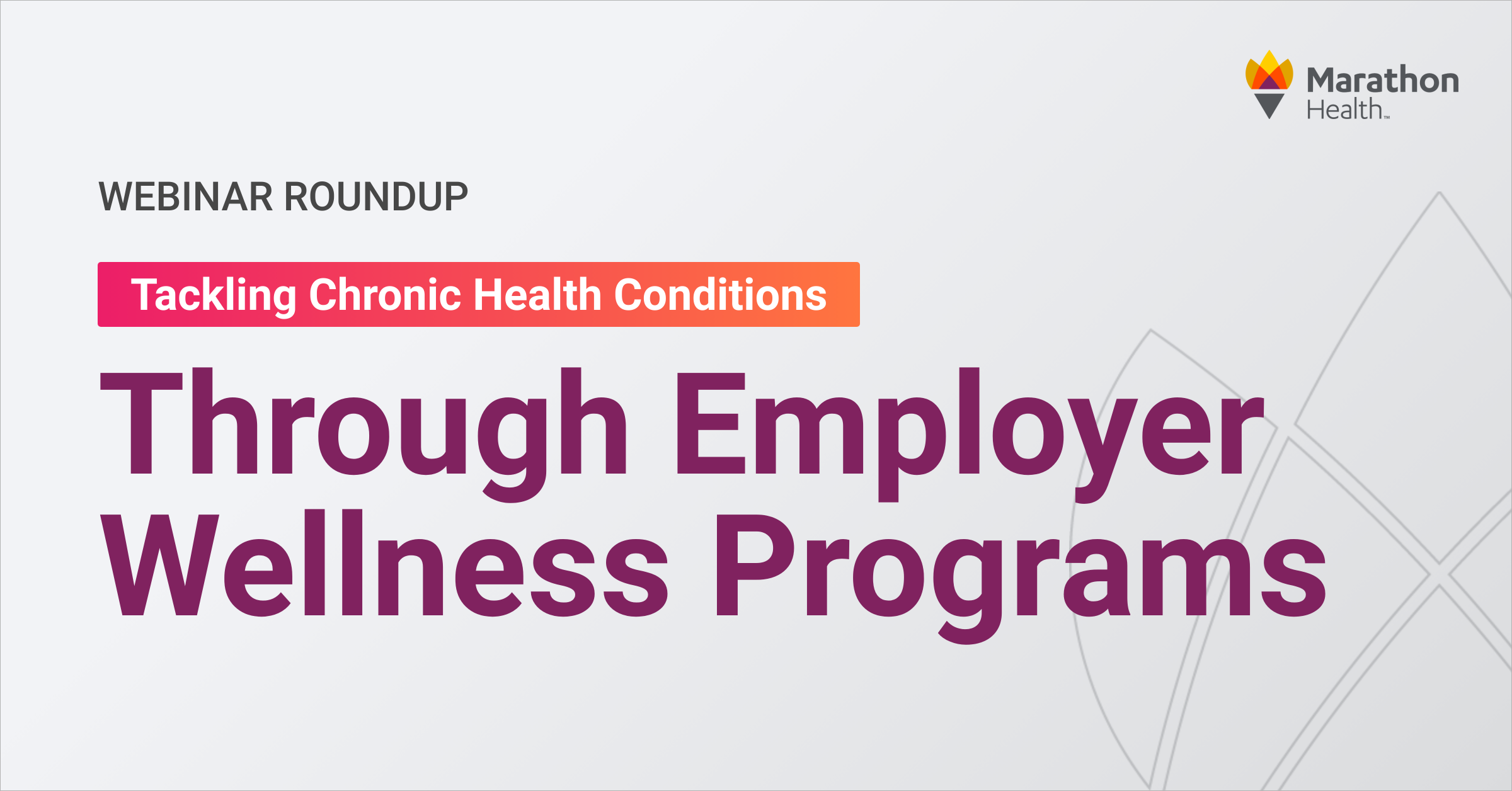Tackling Chronic Health Conditions Through Employer Wellness Programs
October 27th, 2023 | 2 min. read

Employers are expected to see health insurance costs in 2024 surge to 6.5% — the largest increase in about a decade, according to new data from Mercer and Willis Towers Watson. To curb costs, employers are looking for better ways to help their employees combat chronic diseases, such as high blood pressure, diabetes and obesity — which make the biggest impact on overall healthcare spending.
During our webinar, Tackling Chronic Health Conditions Through Employer Wellness Programs, Lauren Hutchens, National Director of Health Coaching for Marathon Health, led a discussion with our panel about how health coaching and wellness programs help employees make lasting changes to control and improve chronic health conditions, ultimately driving down coverage costs.
The roundtable discussion includes great insights from:
Jackie Bezy, Health Coach, Marathon Health
Dr. Natasha Parekh, Regional VP of Clinical Leadership, Marathon Health
Keena Zinn, Senior Program Analyst and Health Coach, Marathon Health
Watch the Full Webinar: Tackling Chronic Health Conditions Through Employer Wellness Programs
Early Detection Halts Disease Progression, Reduces Cost
Nastasha kicked the roundtable off by talking about the most prevalent chronic diseases (hypertension, high cholesterol, diabetes) and biggest health care cost drivers (congestive heart failure, chronic kidney disease, coronary artery disease) for Marathon Health employers.
“Complications of our most prevalent diseases are our highest cost conditions,” Natasha says. “What that tells me is there’s a significant opportunity to screen and diagnose those highly prevalent conditions early so we can prevent progression to high-cost conditions like congestive heart failure and end-stage renal disease.”
With early detection and health coaching, members can reverse chronic conditions.
Employer Wellness Programs Promote Care Management
Marathon Health offers a wide range of employer health programming, from one-on-one health coaching sessions to peer support groups on topics that include chronic condition management, healthy eating, stress reduction and more. Employers choose the most effective programs to offer their populations, often letting data guide the way.
“We’re assessing if our programs are moving the needle, not only on the numbers, but on our members’ perception of their health, because that’s a validated measure that indicates their use of future care,” Keena says. “It’s correlated with reduction or improvement in health measures.”
For example, a recent cohort of approximately 55 members enrolled in the Diabetes Self-Management Education and Support program lost a collective 800 pounds, with each participant bringing their A1c into range.
Health programming engages members, and a collaborative care model — that includes health coaches, doctors, nurses, physical therapists and behavioral health specialists — provides members with holistic support.
“It truly makes a difference on progress toward health goals, medication adherence or managing chronic conditions when you have sources of support you can turn to within our care team,” Jackie says. “Also, the patient will say, ‘I have a lot of people in my corner for this. I’m not by myself.’”
Many members first engage with health centers or programming to earn an incentive, but that gives coaches and providers a chance to uncover their intrinsic motivators.
“They get hooked when they actually see the value and the beauty and how much health coaching can change their lives,” Natasha says.
Every journey starts with small steps, but achieving wellness isn’t a quick fix.
“It’s a long-term investment in your employees, and it’s a long-term investment in their health by your employees,” Lauren says. “And that’s where having that collaborative care model and focusing on lifestyle behavior change and core values really helps set long-term success.”
Watch the full video for stories about employees who leveraged worksite healthcare to make lasting health improvements and for tips and strategies to educate and inspire employees to take accountability for their health.
Additional Content You Might Like
S.P.A.R.K. Total Health Program for Employees Sheds Light on Preventing Chronic Health Conditions